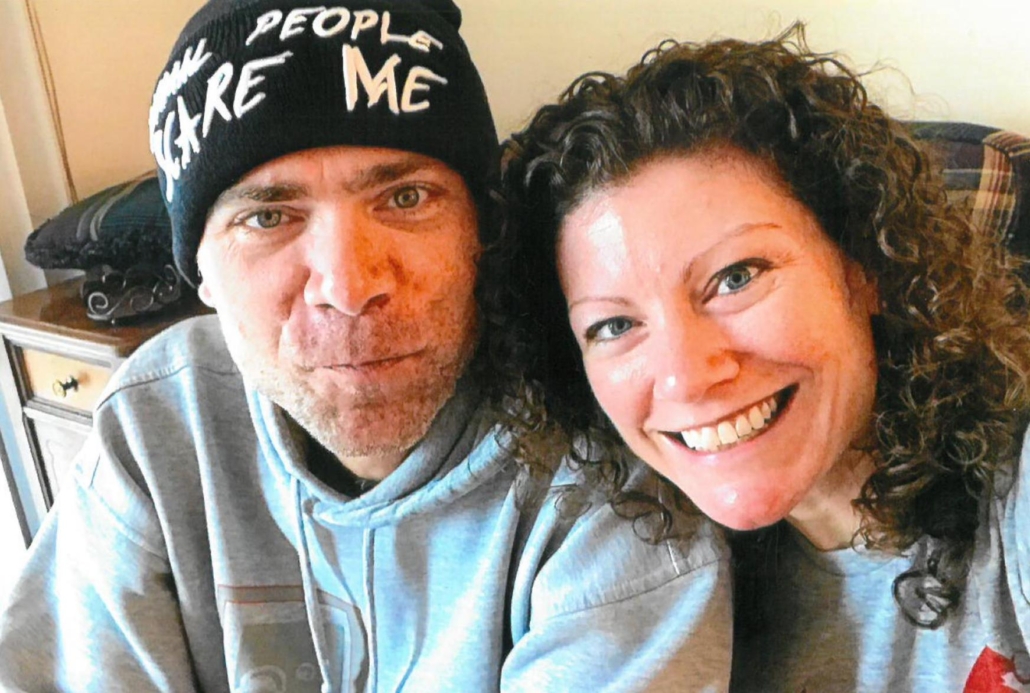As their son recovered from multiple stab wounds and fractures suffered at Bullock Correctional Facility, Brian Rigsby’s parents had their hopes up that he just might find safety through parole. Here’s what happened instead.
By Eddie Burkhalter, Appleseed Researcher

Brian Rigsby with his family (l to r) mom Pamela Moser, sister Elizabeth Neely, and dad Mitchell Rigsby (photo courtesy of Pamela Moser)
Pamela Moser sat in front of the Alabama Board of Pardons and Paroles in late August and waited for her son’s case to come up for consideration. Release was Brian Rigsby’s best chance at escaping the violence that earlier in the month left him with multiple stab wounds and lacerations that weren’t properly treated, his mother, who is a nurse, told Appleseed.
But before Mr. Rigsby’s name was called, Ms. Moser, 67, and her son’s father, Mitchell Rigsby, 68, who came for the hearing, were told that a mistake had occurred and her son would not have a parole hearing that day. It will likely be five years before their son gets a chance for an early release.
For Brian Rigsby, that means five more years in treacherous prisons with easy access to the kinds of drugs that got him there to begin with, but little access to rehabilitation or mental health care that might help him earn parole. Or at least avoid more brutality. It’s a seemingly endless cycle of hopelessness experienced by thousands whose convictions stem from substance use, mental illness or a combination.
Mr. Rigsby, 46, had been turned down at a hearing on July 13, when the only two board members on what is supposed to be a three-member board voted against releasing him under parole supervision. Those two members disagreed on when to reset his next hearing, with one voting to set it off for three years and the other for five years. In the days following that hearing, however, Mr. Rigsby told his mother he’d received a letter from the Alabama Bureau of Pardons and Paroles telling him they’d set him for another hearing on Aug. 31. Everyone got their hopes up.

Brian Rigsby (photo courtesy of Pamela Moser)
“He was so excited about that letter, because it said they were going to reconsider,” Ms. Moser said. She worried that once she had to tell him the hearing never took place his mental health could decline further. She described the incident as “infuriating.”
A Bureau attorney explained to Appleseed that when just two board members vote to deny parole, the next question before them is how long into the future to set the next hearing. If both members can’t decide, according to the Bureau’s rules, the date is automatically set at the maximum, which is five years. Since Mr. Rigsby’s parole hearing in July, a third board member was appointed, but through July the Board was on track this year to release the smallest percentage of eligible prisoners on parole in over a decade, according to Alabama Daily News, “granting parole to just 7.5% of the 2,332 prisoners eligible for release as of Thursday.”
There is good reason for Ms. Moser to want her son out of Alabama prisons. After that July parole denial, Mr. Rigsby was attacked at Bullock Correctional Facility by two men in a dispute over drugs, Ms. Moser said her son told her. He was beaten in the head with a broom handle and stabbed several times before a correctional officer intervened, she said. Mr. Rigsby has served nearly two decades in Alabama prisons with mental illnesses diagnosed not long before the crime for which he was convicted.
At a prison visit in August, his mother said she saw five wounds of between a quarter of an inch to a half inch long on his head, and while some had sutures she said “one was gaped open,” as were stab wounds on his calves. Just as concerning was his apparent mental state. During the visit her son dumped his food from his plate and ate it from the table “like a caged animal,” Ms. Moser said.
The Alabama Department of Corrections (ADOC) in a response to Appleseed’s questions about the attack said that Mr. Rigsby was taken to a local hospital on Aug. 23 after an apparent assault and that “a suspect has not been identified by Rigsby.” He was returned to Bullock prison on Aug. 26, the mother said. The warden told her that in addition to the stab wounds her son had fractured ribs and a facial fracture. Mr. Rigsby told his mother in a Sept 7 phone call from prison that the doctor who treated him said he also had two small skull fractures.

Brian with his sister Elizabeth (photo courtesy of Pamela Moser)
Her son declined to tell prison staff who attacked him over fear that doing so could place him in greater jeopardy, Ms. Moser said. “He’s afraid that if he reports them, even though they say they’ll protect him, you don’t know that that’s going to happen,” she said. She talked to her son after his return to Bullock prison and said he seemed very distraught and just kept saying “I love you.”
Speaking to the prison’s warden on Sept. 4, Ms. Moser said she was told that her son would be moved to another prison because “they can’t figure out who did this to him.” The next day Mr. Rigsby was moved to Elmore Correctional Facility, according to ADOC records.
Mr. Rigsby is serving a life with parole sentence after pleading guilty in 2007 to first degree robbery in which no one was physically harmed, court records show. In 2003 at the age of 27 Mr. Rigsby robbed a pharmacy in Walker County, according to court records, and stole $315 and more than 1,000 combined oxycontin, methadone and oxycodone pills. Mr. Rigsby had four prior felony convictions – three burglary convictions and one conviction of possession of a forged instrument.
Drugs have consumed much of their son’s adult life, his parents explained, and now Mr. Rigsby finds himself in Alabama prisons, where instead of effective drug treatment that might prevent his return to prison, he’s surrounded by drugs at every turn, drugs that are most often brought in by correctional officers and prison staff. Those drugs are also driving much of the violence and death.
The federal government in December 2020, sued the state and the Department of Corrections alleging that the state “fails to provide adequate protection from prisoner-on-prisoner violence and prisoner-on-prisoner sexual abuse, fails to provide safe and sanitary conditions, and subjects prisoners to excessive force at the hands of prison staff.”
In a May 2021 amended complaint in the ongoing litigation, the DOJ makes clear that ADOC has fallen short in addressing the primary contributor to the unconstitutional violence: contraband. (“ADOC told us that ADOC staff are bringing illegal contraband into Alabama’s prisons,” a 2019 report by the DOJ noted.)
The DOJ notes in the complaint that drugs and “the inability to pay drug debts leads to beatings, kidnappings, stabbings, sexual abuse, and homicides.”
While there have been several recent arrests of ADOC correctional officers charged in connection with contraband, drugs still remain plentiful in prisons, incarcerated people tell Appleseed.

Brian with his sister Elizabeth when he was paroled in 2017 (photo courtesy of Pamela Moser)
Mr. Rigsby was released on parole in 2017, and was sent back to prison to serve that life with the possibility of parole sentence the following year, not because of a new criminal charge but because of a technical parole violation.
Just prior to the pharmacy robbery Mr. Rigsby was diagnosed with bi-polar disorder, psychotic disorder, opiate/polysubstance dependence and suicidal ideation and attempts, his attorney wrote in a court filing prior to his conviction. The attorney wrote that he was hospitalized at the South Lake Center for Mental Health in Merrillville, Indiana for a suicide attempt “where he stabbed himself in the neck with a paring knife.”
Ms. Moser said the doctor in Indiana told her the psychotic break could have been from coming off Methadone too quickly, and that a diagnosis of bipolar disorder can’t be discerned from one incident, but that the suicide attempt was “very intentional” and required exploratory surgery on his neck.
Alabama’s failure to properly treat and keep safe from harm those incarcerated people with mental illnesses is the centerpiece of a long-running lawsuit that seeks to force ADOC to make corrections.
The federal judge in the 2014 Braggs v. Dunn lawsuit said in 2017 that Alabama’s treatment of mentally ill prisoners was “horrendously inadequate” and that prisons were woefully understaffed, which exacerbated the mistreatment.
“Prisoners do not receive adequate treatment and out-of-cell time because of insufficient security staff,” Judge Myron H. Thompson of the U.S. District Court for the Middle District of Alabama said in a 2021 order. “They are robbed of opportunities for confidential counseling sessions because there are too few staff to escort them to treatment, forcing providers to hold sessions cell-side. They decompensate, unmonitored, in restrictive housing units, and they are left to fend for themselves in the culture of violence, easy access to drugs, and extortion that has taken root in [DOC] facilities in the absence of an adequate security presence. The resulting sky-high rates of suicidality divert scarce mental-health resources from treatment provision to crisis management, exacerbating the deficiencies in care.”
Suicides, and suicide attempts, among those with mental illnesses is all too common in Alabama’s prisons, Thompson has noted in his orders. In “light of the significant number of wholly unanticipated suicides in ADOC segregation units, by individuals who were not on the mental-health caseload, defendants’ contention that ‘the system works’ is astonishing,” Thompson wrote in a 2019 opinion.

Brian with his mom Pamela when he was paroled in 2017 (photo courtesy of Pamela Moser)
As for Mr. Rigsby, he has not received any treatment for mental illness while in custody of the state, his mother said.
“The robbery happened soon after he came back to Alabama, and I have often thought Brian didn’t plan on coming out of that drugstore alive. Once he got in the system, there was no follow up, as far as I know, about evaluating his possible/probable bipolar diagnosis,” Ms. Moser said.
Last year, Alabama prisons saw a record 270 deaths, which was nearly 200 percent higher than a decade ago. Between January and June, the last period in which ADOC has released numbers, there have been 164 deaths in state prisons. If that pace keeps up, 2023 will be another record year of prison deaths in Alabama.
Ms. Moser worries that even if her son survives and is some day released, he may come out a different person.
“The longer they stay in there, the less chance that they’re going to be able to function in society,” she said.






Leave a Reply
Want to join the discussion?Feel free to contribute!